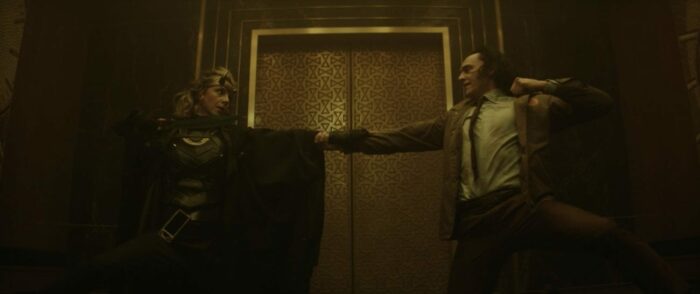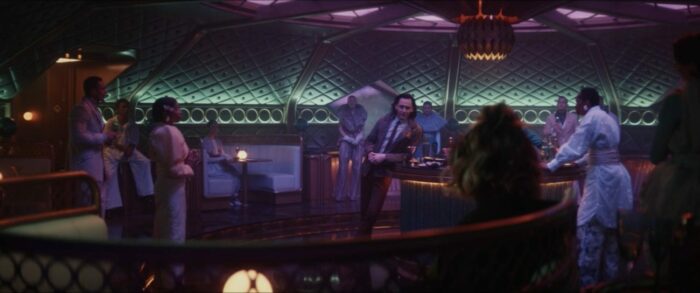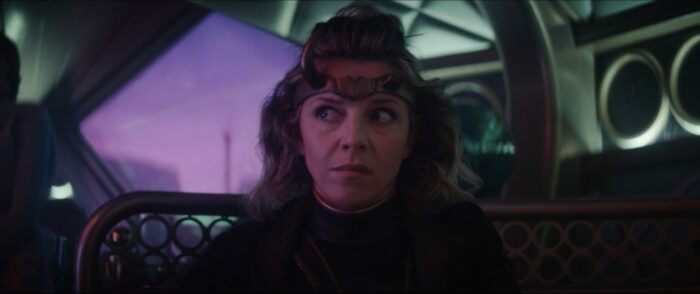We have come to a glorious, glorious point where Loki consists solely of brilliant character work set against a backdrop of comic book easter eggs, goofy sci-fi junk, and underhanded social commentary. I love it dearly. Loki S1E3 (“Lamentis”) has dropped us at the end of the world—or, rather, someone else’s.
At the end of S1E2 (“The Variant”), Loki (Tom Hiddleston) and the titular “Variant” (Sophia Di Martino) escape Mobius and the time agents. Loki S1E3 picks up immediately after, as the Variant returns to the TVA and attempts to kill the Time Keepers. Loki ruins her efforts, and the two use the Variant’s stolen “TemPad” (the little thing the TVA uses to jump between points in time and space) to run away to an apocalypse on a faraway planet called Lamentis-1, which is about to be blown to pieces.
*stops for air*
“Lamentis” takes place as Loki and the Variant, who changed her name from Loki to Sylvie (which we will discuss in a moment) attempt to recharge the TemPad to return to the TVA and… destroy it?

To start, Sylvie is an absolute delight on screen. Di Martino plays her as a slightly more down-to-earth variant of the mischief god; she’s more self-sufficient, with her chaos worn down by years of isolation and learned maturity. Her chemistry with Hiddleston brings back memories of the first Thor film and the sibling-rivalry humor that hit its peak in Thor: Ragnarok.
There were even a few specific shots that echoed old Loki/Thor scenes: the classic “Another!” and, as eagle-eyed fans pointed out, a shot-for-shot recreation of an early Thor argument, which occurred at the climax of Loki S1E3 between Loki and Sylvie.
The long-awaited character analysis arrived in a beautiful sequence as Loki and Sylvie snuck onto a train full of rich people escaping Lamentis’s destruction. The two Variants sit at a booth bathed in soft, colorful lighting and compare childhoods with mutual distrust and admiration.
As they speak to each other, especially as Sylvie wakes up from a nap and is greeted by Loki singing drunkenly in Asgardian to a train car of strangers, you get the sense that the rare honesty we are offered is only occurring because, well… they’re speaking to themselves. It’s a tender and unique relationship.
Loki tells the story of his mother Frigga’s magical education; Sylvie explains that her mother died when she was a child. Loki asks if Sylvie has a boyfriend waiting at the end of her mischievous journeys, Sylvie says yes (with a bit of a smirk, as though to imply there’s more to the story than she’s willing to share).
Sylvie asked Loki if he’s ever had a would-be princess… “or perhaps, another prince?”
And then, to my utter amazement, Loki said “A bit of both.”
ALL RIGHT!
All right, I’ll bite.
It’s time to talk about Marvel and The Gays. (I say, as one of them.)

In the wake of a very complicated recent Variety interview in which Anthony Mackie (Sam Wilson of The Falcon and the Winter Soldier) was prompted by a questionable reporter to single-handedly explain Marvel’s relationship to its gay fans, there has been more turmoil than ever about Marvel’s history of queerbaiting.
For those unfamiliar with the term, “queerbaiting” refers to a process by which media producers will hint at queer characters or relationships existing in their works with no intention to follow through by making their queerness explicit, or denying these characterizations publically. Some recent Disney examples you may have heard through the grapevine might be:
- The Russo brothers making a massive, headline-worthy deal about Marvel’s “first gay character” appearing in Avengers: Endgame, only for it to be a one-line cameo dropped in by an extra (played by Joe Russo).
- The blink-and-you’ll-miss-it lesbian kiss in the background at the end of Star Wars: The Rise of Skywalker (cut from some international versions of the film).
- The writers of The Falcon and the Winter Soldier dropping a reference to Bucky Barnes looking at men’s Tinder profiles in the pilot of the show, telling reporters that audiences would have to “wait and see what happens,” then insisting he’s straight after the first season finished airing.
These tactics and the reactions they cause are not “fans making a big deal about nothing”—they are intentional. They are used very simply to boost ratings, especially in weekly television shows. In many cases, such as the Bucky Tinder incident in The Falcon and the Winter Soldier, it will be a reference so specific that it must have been intentional, but it is only noticeable to people within the “in-group,” (i.e., gay men). Straight audiences might never know, and the shows and movies will still be marketable to a wider, homophobic audience or for international release.
Especially after the rolling-in-the-grass, couples-therapy-having, Bucky-looked-at-men’s-Tinder-profiles disaster that was the Sam/Bucky relationship in The Falcon and the Winter Soldier, I had given up on Marvel being brave enough to actually have queer main characters in any of its major properties.
(This is not about Anthony Mackie’s comments in Variety, by the way. While what he said was clumsy and contributes to harmful stereotypes about queer men especially, I can completely understand his feeling uneasy about being asked to defend Marvel’s cynical use of queerbaiting to draw in fans. There have also been accusations that the particular reporter who interviewed Mackie has a history of painting Black interviewees in a bad light and taking their statements out of context completely. Mackie should not have to be Disney’s shield.)
When Loki was first in development, there were whispers that the show would explore Loki’s genderfluidity, as both in Norse mythology and the Marvel comics, the character is known to be genderfluid—and, in many stories, Loki is bisexual (or otherwise queer in some way). Well, Loki S1E1 (“Glorious Purpose”) aired and OH, WOW! A one-second shot identifies the sex on Loki’s TVA file as “fluid”! Incredible move for queer representation. Thank you for your bravery, Marvel.
Needless to say, I wasn’t expecting anything from this show. I’d given up long ago on meaningful, invested, obvious, leading LGBTQ+ rep from Disney as a whole (I’m sure Luca was great, y’all, but I don’t need to see ONE more movie where being gay is a metaphor. (Yes, I will watch it eventually and cry my eyes out.)
But I gotta say… “Lamentis” got me good.
Now I won’t be giving Marvel itself credit until I see with my own eyes two leading characters of the same gender smack their lips together for more than three seconds in a Les Miserables-style closeup, but Loki writer Bisha K. Ali and director Kate Herron have given us a gift.
In Loki S1E3, A verbal confirmation of Loki being in past relationships with men was uttered on Disney+ for all the world to see, and Marvel cannot take it back now. (Unless they send the TVA to scrub this timeline completely, which I wouldn’t put past them.)

When Loki said “A bit of both,” I surprised myself by tearing up immediately. He is the first MCU lead to be known on-screen as a LGBTQ+ character. Loki specifically—as a shapeshifter, an antihero, a misunderstood sibling, and 2012 emo kid complete with long black hair—has been a queer icon to his fans for years.
So much LGBTQ+ representation nowadays relies on focus group studies and shallow characterizations. The well-written characters are found in small projects—no lesser in quality or importance (perhaps even more valuable than big-budget studio works), but less available to the general public. It’s hard for us to share our stories with the world, to seek empathy and understanding, without being censored by somebody.
Loki is complex. He’s been a villain. He’s tried to run from his past and create spaces of compassion for himself because of the pain he’s been through. He has failed. He’s learning to succeed. He’s learning to love. He sings drunkenly at strangers on trains and lets goats loose in Pompeii.
We’ve yet to see if that line made it to international cuts of Loki S1E3 (to all the queer people in China who were robbed of that GROUNDBREAKING lesbian kiss in Rise of Skywalker, I sincerely hope you have a good VPN to watch this show), or how the general heterosexual audience of Loki took it. For now, at least, Loki is bisexual.
In other Loki news (as though all that wasn’t enough), another fan theory was proven true this week: all the TVA agents are Variants.

In a flashback that opened Loki S1E3 (“Lamentis”), we saw Sylvie in Hunter C-20’s mind, trying to access the location of the Time Keepers. The two sit in a tropical bar, drinking and laughing as Sylvie breaks the magic with prying questions.
As Sylvie and Loki approach the “ark” on the planet Lamentis that will supposedly take them to safety, Sylvie explains how her enchantments work: “In order to preserve the connection, I have to create a fantasy from their memories.” She explains of C-20: “Her mind was messed up… I had to pull a memory from hundreds of years prior, before she even fought for them.”
Loki (and the audience) freeze: “I was told that everyone who works for the TVA was created by the Time Keepers.”
Sylvie: “That’s ridiculous. They’re all Variants, just like us.”
Loki: “They don’t know that!”
It seems that perhaps Mobius’s obsession with Jet Skis is not simply an obsession but a memory. Sylvie’s intent to destroy the TVA also makes a lot more sense with this piece of information, as the Time Keepers are clearly intent on controlling this timeline and its inhabitants through less than ethical means.
And, finally, that brings me back to Sylvie.

As many fans have speculated since we first saw her last week, Lady Loki is not quite as she seems. The name “Sylvie” comes from a Marvel comics character known as The Enchantress, a young girl named Sylvie Lushton from the Young Avengers comics, who was a normal girl on Earth until Loki gave her the powers of Amora the Enchantress (another Asgardian antihero) in order to wreak havoc on the Young Avengers. She becomes, colloquially, the second Enchantress.
This character seems to be a mix of the “Lady Loki” character from the comics (Loki’s soul in Sif’s body… ew) and Sylvie Lushton, leaning character-wise towards the latter while still being a Variant of Loki himself.
Sylvie revealed her new name to Loki after rejecting several comparisons that he made between the two of them. This, when paired with Loki’s line, “I wouldn’t treat me like this” from Loki S1E2 (“The Variant”) as she beat him up, leads some fans to believe that she may still be concealing her true identity.
The Enchantress is an immensely powerful magician, and as the MCU expands to include many different variations of magic powers and universes (Doctor Strange and the Multiverse of Madness, anyone?), there are many rumors circulating about Sylvie’s future on Loki and in the MCU at large.
For now, at least, we can enjoy the small things about these characters that are what got us invested in all this magical stuff in the first place. Sylvie taught herself magic. Mobius loves Jet Skis.
Loki is bi.

